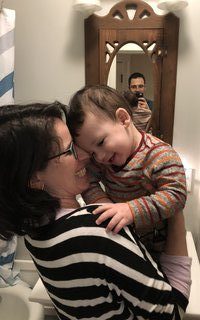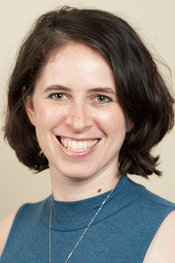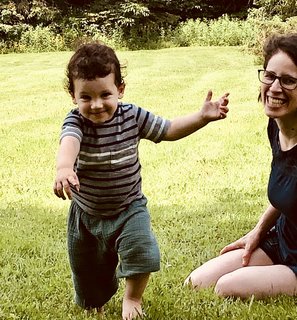08
Jul 2019
Becoming Mama, Transforming Self
One night when my son was about five months old, I looked down at his round baby belly and felt distant from God. Exhausted and recently back to work, my ritual practice was more or less on hiatus. (When my husband heated up the waffle iron the day after Pesach, we found a whole waffle inside it from who knows when.) My prayer practice could be boiled down to “Please God, help me make it through the day.” (This may actually be the purest prayer, but still…) And most striking and hardest to describe, since a bad few months of perinatal depression, I couldn’t feel God around me the way I used to.
Holding Abraham that night, in a moment of grace I remembered that renowned art therapist Pat Allen (mother of Wexner Graduate Alum Adina Allen, Class 21) encourages us to get curious in any situation and ask: “What else might this be?” What else, other than fatigue, postpartum depression and an overwhelmed feeling might this be? A memory returned to me of a comment Wexner Graduate Alum Shoshie Lockshin (Class 19) made at a long-ago Winter Institute. She was holding her baby in a session about hiyyuv (religious obligation) and said: “Miss a mincha? Sure. Miss a feeding? NO!” I remembered Shoshie’s voice as fierce and tender at once. She was making a point about what was truly obligatory in her life at that moment – feeding her child – and putting it into conversation with the Jewish relationship to God. Looking at Abraham through this lens, it wasn’t a choice between God and my baby. In fact, I could see that right beneath his skin shimmered the force that started the universe and that I was obligated to be in sacred service.
For the first months, being in sacred service to my son felt mostly strange and terrible. Mah nora hamakom hazeh – how awesome is the place of new motherhood. And how crazy-making. Some days it felt like Abraham had grabbed my heart in his tiny fist when he was born and pulled me inside out, so that raw, vulnerable flesh was now on the outside of me. I was rapturously in love with him and it hurt like hell. Honestly, I had expected a higher ratio of pleasure to pain. And then I remembered nafshi cholat ahavatecha, “My soul is sick with love for you!” from Yedid Nefesh, a love song to God. New motherhood was a crash course in the truth that service, love, vulnerability and heartbreak come as a package.
When Abraham was born, I jumped off the Jewish cycle of time and toppled onto the carousel of baby time. Eat, sleep, wake, repeat… Talk about zariz lamitzvah – rushing to do a mitzvah! When he was an infant, I would catapult over whatever my own needs were in order to meet his, without thinking and without calculation, drawn forth by an instinct deep in my gut I hadn’t known was there. My drive to care for him obliterated all other obligations, like the father in Pete Seger’s folk tale Abiyoyo, who has a magic wand that makes things disappear. I had never been completely observant of all the rituals of Jewish time, but I tried and I had drawn great solace and strength from them. Enter Abraham and the magic wand went whoosh. There went my time-bound practice (and there came a whole new understanding of why women are traditionally not required to do time-bound mitzvot.)
 But as Abraham became an older baby and then a toddler, I saw the markings of Jewish time all over our days, in creative and surprising ways. Beyond the bedtime Shema and singing Modeh Ani in the mornings, parenting a young child is full of what one might call time-bound mitzvot. Wake time, meal times, naptimes, playtime and transitions all have a steady and predictable rhythm. Like many caretakers, I made up little songs to go with every activity, including hand washing, tooth brushing, getting dressed and getting in the car, along with a melody to each beloved Sandra Boyton board book. Abraham claps to ask for the appropriate song and he shakes his head with a scowl if I sing the wrong one. (Will he be a stickler for the right nusach in synagogue when he gets older?) It only dawned on me recently that I’d created a liturgy to mark the moments of our day.
But as Abraham became an older baby and then a toddler, I saw the markings of Jewish time all over our days, in creative and surprising ways. Beyond the bedtime Shema and singing Modeh Ani in the mornings, parenting a young child is full of what one might call time-bound mitzvot. Wake time, meal times, naptimes, playtime and transitions all have a steady and predictable rhythm. Like many caretakers, I made up little songs to go with every activity, including hand washing, tooth brushing, getting dressed and getting in the car, along with a melody to each beloved Sandra Boyton board book. Abraham claps to ask for the appropriate song and he shakes his head with a scowl if I sing the wrong one. (Will he be a stickler for the right nusach in synagogue when he gets older?) It only dawned on me recently that I’d created a liturgy to mark the moments of our day.
With clear routines around boundaries, sleep and meals, my husband and I have done our best to create what Pamela Druckerman calls a cadre – a strong structure within which a child has lots of freedom. I feel bound to this structure and it is indeed incredibly freeing. I see how smoothly and joyfully we go through most days together, how secure Abraham is in knowing the routines, and how adventurous and focused he is in his playtime. I wonder if this is how living in strict accordance with one’s understanding of halacha (the rules of Jewish life) functions at its best.
I’ve enjoyed seeing how much creativity comes out for me in parenting, from the cute little compositions for our daily toddler liturgy to the creation of the bigger picture cadre. But the most challenging creative work has been the remaking of myself. For a while I resisted this. After all, I’m a daughter of the girl empowerment era and received the message from school and TV that I could and should be anything I wanted to be and should not let having babies get in my way. But school and TV were blatantly wrong. Not to put too fine a point on it, but Abraham’s birth led to a seismic upending of my priorities, sense of self and career. The most obvious example of this is that I dropped to part-time pulpit work, which had not been the plan, and leaned in hard to full-time mothering. (Yes, with few exceptions mothering is always full-time. It doesn’t matter how much paid work you also do.) In ways I do not have space to tell you about here, I have been recreated even more fundamentally in my relationship to God, to humanity, to other children and to the fact of my own existence.
It’s easy to think about creativity in leadership as an outside job and to pull examples of creative problem solving, creative projects and creative expression. But creativity is also an inside job. It is the work of letting ourselves be recreated – by our choices, by the people close to us, by circumstances beyond our control – and reflecting on that transformation the way we would any leadership challenge. After all, when you think about it, motherhood is the most primal leadership role and as I read recently, a mother is no more a woman with a baby than a butterfly is a caterpillar with wings.

Get To Know The Author
Wexner Graduate Alum Rabbi Shoshana Meira Friedman (Class 22) is the mother of Abraham Zerachia Dov Schachter, age 18 months. As of July, she is the Director of Professional Development at Hebrew College, where she was ordained in 2014. Her new blog Beloved on the Earth: Honest Reflections from a Beautiful and Unsafe World, can be found at rabbishoshana.com.
Other posts by this author ›

